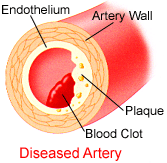Ischemic Stroke (caused by a blockage)
There are 2 kinds of ischemic stroke: thrombotic stroke and embolic stroke. Together, the two types of ischemic stroke account for about 87% of all strokes.
 Thrombotic stroke, the most common type, happens when a blood clot (called a thrombus) blocks the blood flow to parts of the brain. A thrombus may form in an artery affected by atherosclerosis. Atherosclerosis is a condition in which the artery lining becomes thickened and narrowed by plaque. Plaque is made of fat, cholesterol, fibrin (a clotting material), and calcium. As plaque builds up in the arteries, blood flows more slowly and less smoothly, leading to clotting. A vessel narrowed by atherosclerosis is more likely to be blocked by a clot, stopping the blood flow. Thrombotic strokes usually happen at night or in the early morning. A transient ischemic attack (TIA), or "mini stroke," usually happens before a thrombotic stroke.
Thrombotic stroke, the most common type, happens when a blood clot (called a thrombus) blocks the blood flow to parts of the brain. A thrombus may form in an artery affected by atherosclerosis. Atherosclerosis is a condition in which the artery lining becomes thickened and narrowed by plaque. Plaque is made of fat, cholesterol, fibrin (a clotting material), and calcium. As plaque builds up in the arteries, blood flows more slowly and less smoothly, leading to clotting. A vessel narrowed by atherosclerosis is more likely to be blocked by a clot, stopping the blood flow. Thrombotic strokes usually happen at night or in the early morning. A transient ischemic attack (TIA), or "mini stroke," usually happens before a thrombotic stroke.
Embolic stroke is caused by a clot that travels from somewhere else in the body, usually the heart. The clot then blocks an artery leading to or in the brain. An embolic stroke happens when a piece of clot called an embolus breaks loose and is carried by the bloodstream to the brain, where the larger arteries branch off into smaller vessels. The blood clot reaches a point where it can go no farther. It becomes wedged, plugging a small cerebral artery and cutting off the blood supply to the brain.
Most emboli are caused by atrial fibrillation, and according to the American Heart Association, about 2.7 million Americans have this condition. Atrial fibrillation is an abnormal, rapid heartbeat where the two small upper chambers of the heart (called the atria) quiver instead of beating. Quivers cause the blood to pool, forming clots that can travel to the brain and cause a stroke.
Hemorrhagic Stroke (caused by bleeding)
There are 2 kinds of hemorrhagic stroke: cerebral hemorrhage and subarachnoid hemorrhage.
Cerebral or intracerebral hemorrhage is caused by a cerebral aneurysm, which is the ballooning out of a weak spot in a blood vessel of the brain. When the aneurysm bursts, there is bleeding into the brain. The amount of bleeding and the location in the brain determine how severe the cerebral hemorrhage is.
In many cases, people with cerebral hemorrhages die from increased pressure on their brains. But people who survive a cerebral hemorrhage tend to recover more fully and have fewer disabilities than those who have had strokes caused by a blockage (ischemic strokes). Ischemic strokes are more devastating because part of the brain dies when a blood vessel is blocked, and the brain cannot make new cells to replace the cells that have died. But with a cerebral hemorrhage, the stroke is caused by the pressure of the blood pushing against part of the brain. If the person survives a cerebral hemorrhage, the pressure slowly goes away, and the brain may get back some of its former function.
A subarachnoid hemorrhage happens when a blood vessel on the surface of the brain bursts. The burst vessel bleeds into the space between the brain and skull, called the subarachnoid space. With this kind of hemorrhage, the blood does not get into the brain.
With both kinds of hemorrhagic stroke, the burst blood vessel may have been weakened by a head injury or by a condition present since birth. Hemorrhagic strokes can also result from uncontrolled high blood pressure.
Return to main topic: Stroke
Updated August 2016



